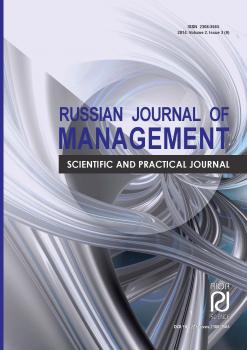The article deals with the specifics of the main factors of quality of corporate governance in the Russian Federation on the basis of global trends in corporate reporting "standardization" and "mathematization" of administrative decisions. The use of fuzzy cognitive maps in addition to the cognitive matrix, gives visibility and visualization semi factors allowing, with varying degrees of detail to systematize them as a target-driven, intermediate, promote and prevent. According to the Russian scientific community, among the 35 parameters, affecting the quality of corporate governance, according to the cognitive analysis to the dominant factors of mutual discord are the following: 1) inefficient system of quality management; 2) high transaction costs of interaction between participants of corporate governance; 3) concealment of material information; lack of a clear separation of functions of control and management stock ownership; 4) low standard of living; 5) low organization of monitoring and control in the redistribution of resources companies. The article concluded that cognitive modeling tools enable us to obtain qualitative information, which increases the level of soundness and integrity management solutions in the field of semi-parameters of corporate governance.
corporate governance, agency problem, corporate accountability, cognitive modeling, fuzzy cognitive map
1. Глобальный вектор и основные тренды изменения качества корпоративного управления
Глобальные тренды корпоративного управления, связанные с усилением роли различных стейкхолдеров, изменяют не только ландшафт взаимодействий основных участников корпоративных отношений — акционеров, членов совета директоров, топ–менеджеров, но также влияют на процессы принятия и реализации стратегической деятельности фирмы на основе разнообразных инструментов управления корпоративными рисками, учитывающих значимость организационной бизнес-модели компании, ее влияния на экологию и общество в целом.
Мировой переход к интегрированным формам корпоративной отчетности дает мощный толчок процессам конвергенции национальных моделей корпоративного управления, а также необходимости «тонкой настройки» системных параметров внутренних и внешних механизмов корпоративного управления.
1. The future of corporate reporting: towards a common vision. KPMG International, 2013. URL: https://www.kpmg.com/AU/en/IssuesAndInsights/ArticlesPublications/Better-Business-Reporting/Documents/future-corporate-reporting-towards-common-vision.pdf.
2. Towards Integrated Reporting: Communicating Value in the 21st Century. IIRC, 2011. URL: http://integratedreporting.org/wp-content/uploads/2011/09/IR-Discussion-Paper-2011_spreads.pdf.
3. Putting a price on value. PwC, 2013. URL: http://www.pwc.com/en_GX/gx/sustainability/publications/assets/putting-a-price-on-value_pwc-private-equity-survey.pdf.
4. Business success beyond the short term: CEO perspectives on Sustainability. PwC, 2014. URL: http://www.pwc.com/gx/en/sustainability/ceo-views/assets/pwc-ceo-summary-sustainability.pdf.
5. Sokolov Ya.V. Buhgalterskiy uchet kak summa faktov hozyaystvennoy zhizni [Accounting as the sum of the facts of economic life]. Moscow: Magistr Publ., 2010.
6. Kol’vah O.I., Kopitin V.Yu. International standards of accounting and reporting in the system of credit institutions: mathematical justification and information-technological support. Terra Economicus, 2004, vol. 2, no 1, p. 85-96.
7. Kol’vah O.I. Situacionno-matrichnaya buhgalteriya (Modeli i konceptualjnie resheniya) [Situational-accounting matrix (Models and conceptual solutions)]: Dis. of Dr. of Economics. Moscow, 2000.
8. Isaev D.V. Korporativnoe upravlenie i strategicheskiy menedzhment: informacionniy aspekt [Corporate governance and strategic management: an information aspect]. Moscow, 2010.
9. Yershov D.M., Kachalov R.M. Sistemy podderzhki prinyatiya resheniy v protsedurakh formirovaniya kompleksnoy strategii predpriyatiya [Decision support systems in the procedures of formation of the complex strategy of the enterprise]. Preprint # WP/2013/299. Moscow: Central Economics and Mathematics Institute of Russian Academy of Sciences, 2013.
10. Axelrod R. The Structure of Decision: Cognitive Maps of Political Elites. Princeton, NJ: Princeton University Press, 1976.
11. Avdeeva S.V., Kovriga D.I., Makarenko D.I. Cognitive modeling for solving problems of management of semi-structured systems (situations). Upravlenie bol’shimi sistemami [Control of large systems], vol. 16. Moscow: Institute of Control Sciences of Russian Academy of Sciences, 2007.
12. Gulakov V.K., Lagerev D.G., Podvesovskiy A.G. Decision Support Systems on the basis of cognitive modeling "NEEDLE". Programmnie produkti i sistemi [Software products and systems], 2007, no 3, p. 12.
13. Decision support system “NEEDLE”. URL: http://iipo.tubryansk.ru/quill/download.html.
14. Erohin D.V., Lagerev D.G., Laricheva E.A. et al. Modelling of the innovative mechanism of the enterprise using fuzzy cognitive maps. Menedzhment v Rossii i za rubezhom [Management in Russia and abroad], 2006, no 3.














